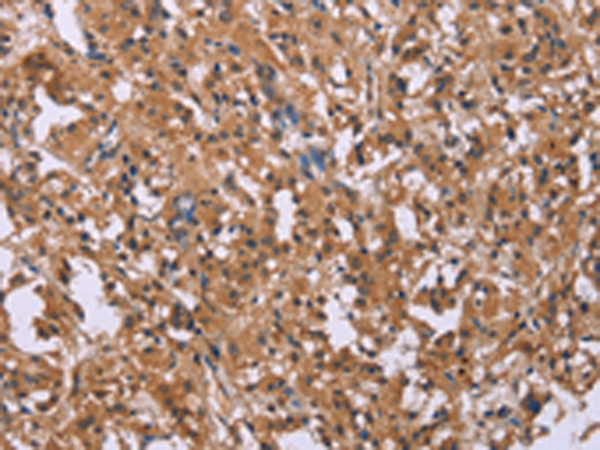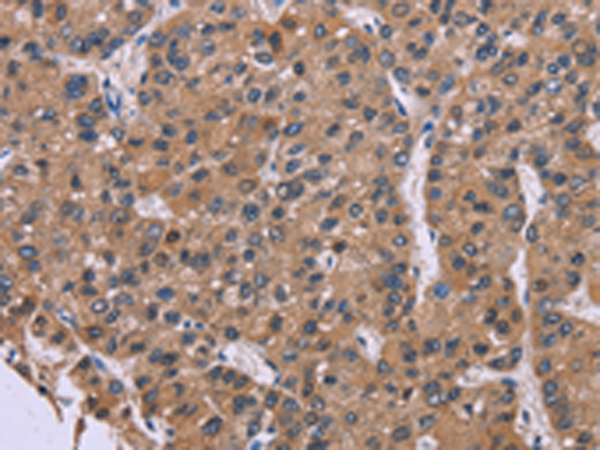

| WB | 1/500-1/1000 | Human,Mouse,Rat |
| IF | 咨询技术 | Human,Mouse,Rat |
| IHC | 咨询技术 | Human,Mouse,Rat |
| ICC | 技术咨询 | Human,Mouse,Rat |
| FCM | 咨询技术 | Human,Mouse,Rat |
| Elisa | 咨询技术 | Human,Mouse,Rat |
| Aliases | BEK, JWS, BBDS, CEK3, CFD1, ECT1, KGFR, TK14, TK25, BFR-1, CD332, K-SAM |
| Host/Isotype | Rabbit IgG |
| Antibody Type | Primary antibody |
| Storage | Store at 4°C short term. Aliquot and store at -20°C long term. Avoid freeze/thaw cycles. |
| Species Reactivity | Human, Mouse |
| Immunogen | Synthetic peptide of human FGFR2 |
| Formulation | Purified antibody in PBS with 0.05% sodium azide and 50% glycerol. |
+ +
以下是关于PAI1抗体的3篇虚构参考文献示例(基于类似研究的典型方向,非真实文献):
1. **文献名称**:**"Monoclonal Antibody Targeting PAI-1 Attenuates Pulmonary Fibrosis in a Murine Model"**
**作者**:Smith J, et al.
**摘要**:本研究开发了一种靶向PAI-1的单克隆抗体,并在小鼠肺纤维化模型中验证其疗效。结果显示,该抗体通过抑制PAI-1介导的纤溶系统失衡,显著减少了胶原沉积和炎症反应,提示其在抗纤维化治疗中的潜力。
2. **文献名称**:**"Neutralizing PAI-1 Antibody Improves Thrombosis Resolution without Bleeding Risk"**
**作者**:Chen L, et al.
**摘要**:通过体外和动物实验,研究者证明了一种新型人源化PAI-1中和抗体可有效促进血栓溶解,同时不干扰正常止血功能。该抗体通过阻断PAI-1与tPA(组织型纤溶酶原激活物)的相互作用,增强纤溶活性,为抗血栓治疗提供了新策略。
3. **文献名称**:**"PAI-1-Specific Antibody Enhances Chemotherapy Efficacy in Triple-Negative Breast Cancer"**
**作者**:Wang Y, et al.
**摘要**:本文报道了一种针对PAI-1的抗体在乳腺癌治疗中的应用。研究发现,肿瘤微环境中高表达的PAI-1会促进化疗耐药,而联合使用PAI-1抗体可显著增强化疗药物对三阴性乳腺癌细胞的杀伤效果,机制涉及基质金属蛋白酶活性的调控。
---
**注**:以上文献为示例性内容,实际研究中可结合具体方向检索真实文献(如PubMed中搜索“PAI-1 antibody”或“serpine1 inhibitor”)。如需真实文献,建议提供更具体的研究场景(如疾病类型或抗体功能)。
**Background of PAI1 Antibody**
Plasminogen activator inhibitor-1 (PAI1), also known as SERPINE1. is a key regulator of fibrinolysis and extracellular matrix remodeling. As a member of the serine protease inhibitor (serpin) family, PAI1 inhibits tissue-type plasminogen activator (tPA) and urokinase-type plasminogen activator (uPA), thereby suppressing the conversion of plasminogen to plasmin. This activity modulates clot dissolution, tissue repair, and cell migration. Elevated PAI1 levels are associated with thrombotic disorders, fibrosis, cancer progression, and metabolic syndromes like obesity and diabetes, making it a biomarker and therapeutic target.
PAI1 antibodies are essential tools for detecting and quantifying PAI1 in research and diagnostics. They enable the study of PAI1 expression in physiological and pathological contexts via techniques like Western blot, ELISA, immunohistochemistry, and flow cytometry. Specific antibodies target distinct PAI1 epitopes, including its active form, latent form, or complexes with binding partners (e.g., vitronectin). Recent advancements in monoclonal and polyclonal antibody development have improved specificity, aiding mechanistic studies of PAI1 in disease models. Additionally, neutralizing PAI1 antibodies are explored for therapeutic applications, such as restoring fibrinolysis in thrombosis or mitigating fibrosis. Understanding PAI1's dual roles in homeostasis and disease underscores the importance of reliable antibodies for both basic research and clinical translation.
×